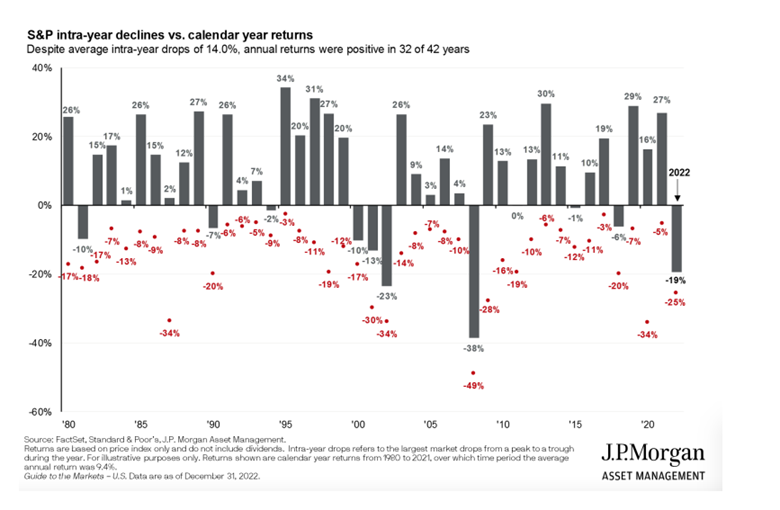There are three words that seem to be everywhere these days: inflation, volatility, and recession. Though inflation has slowed in recent months, coming in at 6% for the 12 months ending February 2023, it is still a far cry from the Fed’s target rate of 2%. What’s more, a recent poll shows that 61% of economists believe a recession is on the horizon for 2023 and the recent bank failures certainly haven’t helped the picture.
Investors are understandably nervous about their investments and their purchasing power. If you are worried about your portfolio, you’re not alone. But during stock market volatility, it’s important to keep a level head to avoid financial mistakes.
Stay calm at times like these, it’s important to put current conditions into perspective. This is not the first time the market has taken a tumble and it won’t be the last. Declines in the S&P 500 Index are actually fairly regular events. In fact, over the last 42 years, intra-year declines have averaged 14% as illustrated by the graph below:

Ride Out the Uncertainty Storm
It’s important to remember that markets dislike uncertainty. Currently, there is a lot of uncertainty regarding continued inflation, interest rate hikes, shockwaves in the banking industry, and ongoing recession fears.
With so much uncertainty, volatility right now is extreme. In January 2022, the VIX (the market volatility index) hit its highest level since 2020. As more information has come out about the Fed’s response to inflation and other factors affecting the market, uncertainty has decreased and the VIX has come back down to 18.81 as of March 31, 2023. As things continue to develop, it is likely that day-to-day market fluctuations will decrease.
Play Dead
There’s an old saying that the best thing to do when you meet a bear market is the same as if you were to meet a bear in the woods: play dead. While easier said than done, successful long-term investors know that it’s important to stay calm during a market correction. We don’t know yet whether the coronavirus fears will translate into an official correction, but the risk always exists.
Market volatility has increased in recent years and the media can often make it seem like each episode is worse than the one before. In reality, volatility does not hurt investors, but selling when the market is down will lock in losses.
Remember That Your Portfolio Is Diversified
Fears about inflation, volatility, and market declines are stressful. However, it is important to keep in mind that while the stock market is down, your portfolio is made up of both stocks, bonds, and other assets that are designed to work together to decrease overall losses. It’s important to consider your specific portfolio, investment horizon, and circumstances when reflecting on economic events. If you have questions about your portfolio, get in touch with our office.
Review Your 401(k) and Other Accounts
Now is a good time to take a look at all your investment accounts, including your 401(k), to make sure they are well diversified. If you have not rebalanced your other investment accounts in the last year, get in touch with our office and we’ll take a look and offer recommendations to minimize potential losses. Remember, those Target-Date funds aren’t always the best option.
Speak With Your Advisor
Whether you’re new to investing or an experienced investor, it’s helpful to consult with an objective third party. Human nature causes us all to act out of emotion when our accounts go down. As an independent wealth manager, we put your best interests first. We seek to serve as a support system for our clients, helping them make informed financial decisions that aren’t driven solely by emotion.
We’re Here for Your Friends and Family
If you have friends or family who need help with their investments, we are happy to offer a complimentary portfolio review and recommendations. We can discuss what is appropriate for their immediate needs and long-term objectives. Sometimes simply speaking with a financial advisor may help investors feel more confident and less concerned with the day-to-day market activity.
Thank you for reading and sharing.
Author

Scott Krase
Wealth Manager Connor & Gallagher
This blog is for educational and/or informational purposes only and does not constitute financial, tax, or legal advice.







